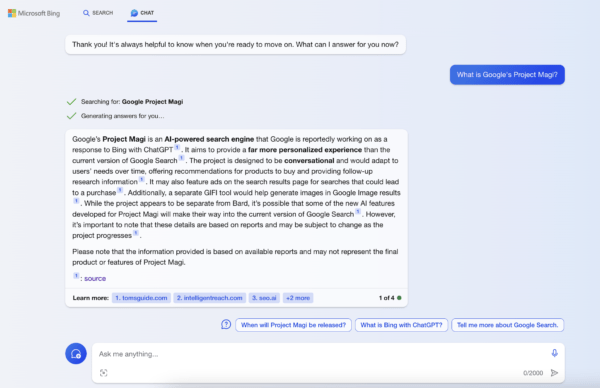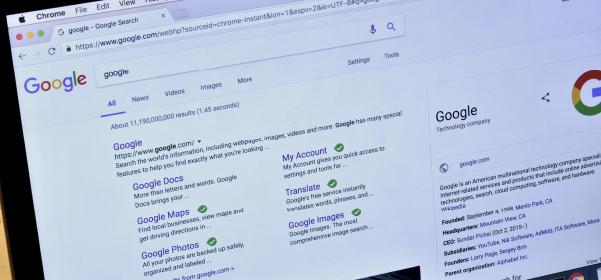The Future Of Search: Inside Google’s Project Magi

Search engines have always been our trusty companions when we need to find information, answers, and even a little bit of inspiration. From the early days of clunky directories to lightning-fast, predictive tools that we use today, the world of search engines has come a long way.
But, what if we told you that Google, the leader of search engines, is cooking up something truly magical?
Say hello to Google’s Project Magi – a name that ignites curiosity and hints at a groundbreaking transformation in the way we explore the internet.
Now, we must admit, there isn’t a ton of information out there involving the details of Project Magi. However, we have managed to uncover some fascinating insights that will capture your attention. Here is what we know.
What Is Project Magi?
Project Magi is Google’s ambitious venture into the world of search powered by artificial intelligence (AI). It’s not just about tweaking the existing search algorithms; it’s a big leap into a new search experience. Google’s got big aspirations with this one.
Picture this: an AI-driven search that’s more intuitive and personalised than ever before. It’s like having a search genie that understands your needs even before you finish typing it. This isn’t your typical search tool; it’s a revolution in the making.
So, why is Google in such a hurry to embrace AI for search? Well, it’s all because of the buzz around AI technology. Everyone’s talking about it, and Google doesn’t want to be left behind. They’re pushing the boundaries to redefine how people use search. It’s a sign that even tech giants like Google can get a little jittery in the face of evolving technology.
However, it’s not all smooth sailing for Google. Rumours are swirling that Samsung might opt for Microsoft’s Bing as its default search engine. Microsoft, not to be outdone, has armed Bing with a powerful chatbot fueled by OpenAI’s large language model. This move could potentially cost Google a hefty sum, around $3 billion. And imagine the stakes if Apple followed.

AI-Powered Search Engine Bing
Google’s previous attempt, Bard, didn’t exactly receive rave reviews. It had a noticeable impact on their stock price and market capitalisation. This stumble only adds to the pressure for Project Magi to deliver.

As for the release date to the public, there is no official word yet. What we do know is that Project Magi was initially launched in May 2023 to a limited group of 1 million users within the United States, and depending on how the trial goes, Google will gradually expand to 30 million by the end of the year. It’s a cautious approach, perhaps acknowledging the complexities of AI-powered search.
What Has Google Said About Project Magi?
Google has kept relatively tight-lipped about Project Magi. Even different Googlers on Twitter have maintained their silence regarding this intriguing venture. The only official statement we have encountered comes from Google spokeswoman, Lara Levin.
“Not every brainstorm deck or product idea leads to a launch, but as we’ve said before, we’re excited about bringing new A.I.-powered features to search, and will share more details soon.”
Google’s silence has only fueled curiosity rather. Despite the hush, Lara Levin’s words give us a glimpse into the potential of this AI-driven endeavour. Keep an eye out for the latest updates as Google unveils more about the future of search.

The Role Of AI & Machine Learning In Project Magi
Imagine a search engine that understands your questions as if you were having a human conversation. That’s Project Magi. Powered by AI, it makes search results not just accurate but highly relevant.
But it also goes beyond that. According to the New York Times, Project Magi uses machine learning, it deciphers intent and context behind your words, ensuring precise results and a seamless understanding of web page content. It’s personalised too, adapting to your search history and behaviours, getting smarter with each use.
Think of it as Siri or Alexa for web search, providing you with quick and concise responses, making information retrieval a breeze.
Impact On Users, Marketers & Businesses
Google’s Project Magi is set to be a game-changer, and its impact on users, marketers, and businesses is undeniable. Marketers are understandably concerned about potential traffic being redirected from their websites. However, there is a silver lining – Project Magi promises an improved user experience, ultimately drawing more users into the Google platform.
This might mean fewer clicks to your website, but it encourages optimising for Google to showcase your offerings. In essence, the search landscape is evolving, and adaptation is key.

Project Magi brings enhanced search accuracy, personalisation, and conversational AI, urging businesses to create more engaging content. Think hyper-targeted content, conversational ads, and a more casual website style. SEO professionals must also adapt to remain visible in AI-generated responses.
As competition intensifies; businesses must innovate to stand out. User engagement and retention become vital. Success in the Project Magi era hinges on versatility – finding inventive ways to cater to both users and AI-generated responses.
Looking Ahead
In anticipation of the upcoming release of Project Magi, the future of search appears more promising than ever. As we look ahead, it’s clear that search engines are on the brink of a remarkable evolution. Project Magi signifies a pivotal moment in this journey.
With Project Magi’s impending launch, we stand at the threshold of an exciting new era in search technology. This innovation promises not just incremental movements, but a profound shift in the way we navigate the digital realm.
Predicting the next phase of search engine evolution, we envision a future where search results are personalised and intuitive. Machine learning and AI algorithms will become even more adept at understanding user intent, providing hyper-relevant results. Voice search, visual search, and AI-powered assistance will redefine the search experience. Search engines will also be more user-friendly, making the digital world more accessible and engaging than ever before.


